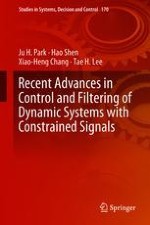This book introduces the principle theories and applications of control and filtering problems to address emerging hot topics in feedback systems. With the development of IT technology at the core of the 4th industrial revolution, dynamic systems are becoming more sophisticated, networked, and advanced to achieve even better performance. However, this evolutionary advance in dynamic systems also leads to unavoidable constraints. In particular, such elements in control systems involve uncertainties, communication/transmission delays, external noise, sensor faults and failures, data packet dropouts, sampling and quantization errors, and switching phenomena, which have serious effects on the system’s stability and performance. This book discusses how to deal with such constraints to guarantee the system’s design objectives, focusing on real-world dynamical systems such as Markovian jump systems, networked control systems, neural networks, and complex networks, which have recently excited considerable attention. It also provides a number of practical examples to show the applicability of the presented methods and techniques.
This book is of interest to graduate students, researchers and professors, as well as R&D engineers involved in control theory and applications looking to analyze dynamical systems with constraints and to synthesize various types of corresponding controllers and filters for optimal performance of feedback systems.
